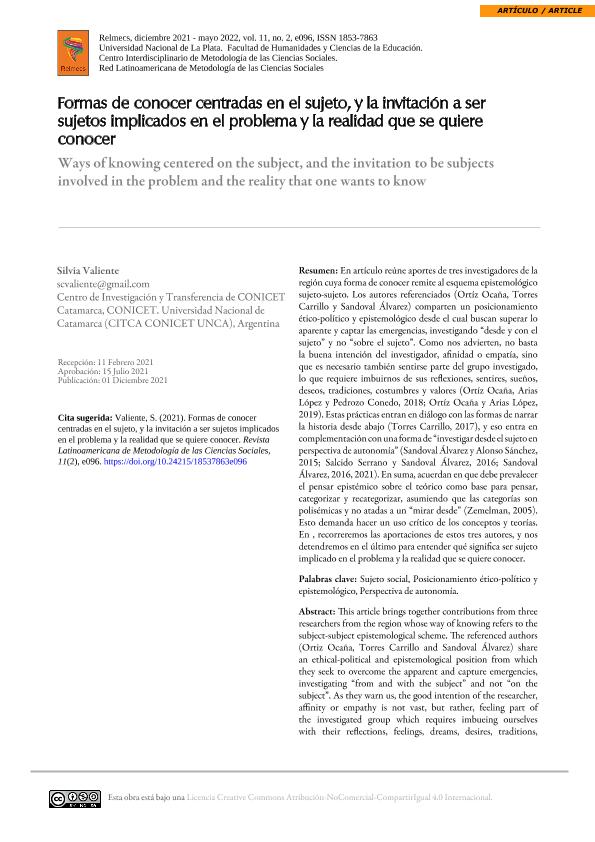Artículo
En artículo reúne aportes de tres investigadores de la región cuya forma de conocer remite al esquema epistemológico sujeto-sujeto. Los autores referenciados (Ortíz Ocaña, Torres Carrillo y Sandoval Álvarez) comparten un posicionamiento ético-político y epistemológico desde el cual buscan superar lo aparente y captar las emergencias, investigando “desde y con el sujeto” y no “sobre el sujeto”. Como nos advierten, no basta la buena intención del investigador, afinidad o empatía, sino que es necesario también sentirse parte del grupo investigado, lo que requiere imbuirnos de sus reflexiones, sentires, sueños, deseos, tradiciones, costumbres y valores (Ortíz Ocaña, Arias López y Pedrozo Conedo, 2018; Ortíz Ocaña y Arias López, 2019). Estas prácticas entran en diálogo con las formas de narrar la historia desde abajo (Torres Carrillo, 2017), y eso entra en complementación con una forma de “investigar desde el sujeto en perspectiva de autonomía” (Sandoval Álvarez y Alonso Sánchez, 2015; Salcido Serrano y Sandoval Álvarez, 2016; Sandoval Álvarez, 2016, 2021). En suma, acuerdan en que debe prevalecer el pensar epistémico sobre el teórico como base para pensar, categorizar y recategorizar, asumiendo que las categorías son polisémicas y no atadas a un “mirar desde” (Zemelman, 2005). Esto demanda hacer un uso crítico de los conceptos y teorías. En , recorreremos las aportaciones de estos tres autores, y nos detendremos en el último para entender qué significa ser sujeto implicado en el problema y la realidad que se quiere conocer. This article brings together contributions from three researchers from the region whose way of knowing refers to the subject-subject epistemological scheme. The referenced authors (Ortiz Ocaña, Torres Carrillo and Sandoval Álvarez) share an ethical-political and epistemological position from which they seek to overcome the apparent and capture emergencies, investigating “from and with the subject” and not “on the subject”. As they warn us, the good intention of the researcher, affinity or empathy is not vast, but rather, feeling part of the investigated group which requires imbueing ourselves with their reflections, feelings, dreams, desires, traditions, customs and values (Ortíz Ocaña, Arias López y Pedrozo Conedo, 2018; Ortíz Ocaña y Arias López, 2019). These practices enter into dialogue with the ways of narrating the story from below (Torres Carrillo, 2017), and this is complemented by a way of “investigating from the subject in perspective of autonomy” (Sandoval & Alonso, 2015, Salcido & Sandoval, 2016; Sandoval 2016, 2021). In sum, they agree that epistemic thinking should prevail over theoretical thinking as a basis for thinking, categorizing and re-categorizing, assuming that the categories are polysemic and not tied to a “look from” (Zemelman, 2005). This requires critical use of concepts and theories. In summary, we will go through the contributions of these three authors, and we will stop at the last one to understand what it means to be a subject involved in the problem and the reality that one wants to know.
Formas de conocer centradas en el sujeto, y la invitación a ser sujetos implicados en el problema y la realidad que se quiere conocer
Título:
Ways of knowing centered on the subject, and the invitation to be subjects involved in the problem and the reality that one wants to know
Fecha de publicación:
03/2022
Editorial:
Red Latinoamericana de Metodología de las Ciencias Sociales
Revista:
Revista Latinoamericana de Metodología de las Ciencias Sociales
ISSN:
1853-7863
Idioma:
Español
Tipo de recurso:
Artículo publicado
Clasificación temática:
Resumen
Archivos asociados
Licencia
Identificadores
Colecciones
Articulos (IRES)
Articulos de INSTITUTO REGIONAL DE ESTUDIOS SOCIO-CULTURALES
Articulos de INSTITUTO REGIONAL DE ESTUDIOS SOCIO-CULTURALES
Citación
Valiente, Silvia Carina; Formas de conocer centradas en el sujeto, y la invitación a ser sujetos implicados en el problema y la realidad que se quiere conocer; Red Latinoamericana de Metodología de las Ciencias Sociales; Revista Latinoamericana de Metodología de las Ciencias Sociales; 11; 2; 3-2022; 1-11
Compartir
Altmétricas




